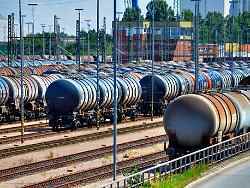priority in rail transport
Federal government gives priority to energy transport
08/24/2022 1:54 p.m
The crisis on the energy market and the low water levels on important waterways are forcing the federal government to act. With a regulation, the cabinet gives priority to coal and oil transport in rail transport. Passengers in passenger transport are then at a disadvantage.
To ensure that coal, oil and other means of production reach the power plants and refineries quickly enough in an emergency, they are given priority in the German railway network. With an ordinance passed by the cabinet, “energy carrier transport by rail and the rail-bound transport of large transformers” are given priority when using the rail network, as the ministries of transport and economy jointly explained.
According to the information, a prerequisite for the prioritization is the “endangerment of the safe and reliable operation of the electricity supply” or “the operation of refineries and the mineral oil supply”. The regulation will initially apply for six months.
The background to the measure is, on the one hand, the tense situation in the energy sector due to reduced gas supplies from Russia and efforts to reduce Russian energy imports as much as possible. In addition, transport on some waterways is currently restricted due to the low water levels.
Higher noise pollution for residents
According to the ministries, rail transport for the energy sector should have priority “within a clearly defined energy corridor network”. The ordinance contains a ten-page list of the relevant train paths. “The interventions in rail transport should be kept as low as possible in order to be able to continue to transport other types of goods according to requirements and to avoid failures or delays in passenger transport as far as possible,” emphasized the ministries.
Residents living near railway lines are also threatened with higher noise pollution: “In order to ensure a stable energy supply and due to existing capacity bottlenecks with rolling stock, it may also be necessary to use freight wagons that no longer meet the applicable noise protection standards,” the ministries explained. “The provisions of the Rail Noise Protection Act are therefore excluded from application in this special exceptional case.”
